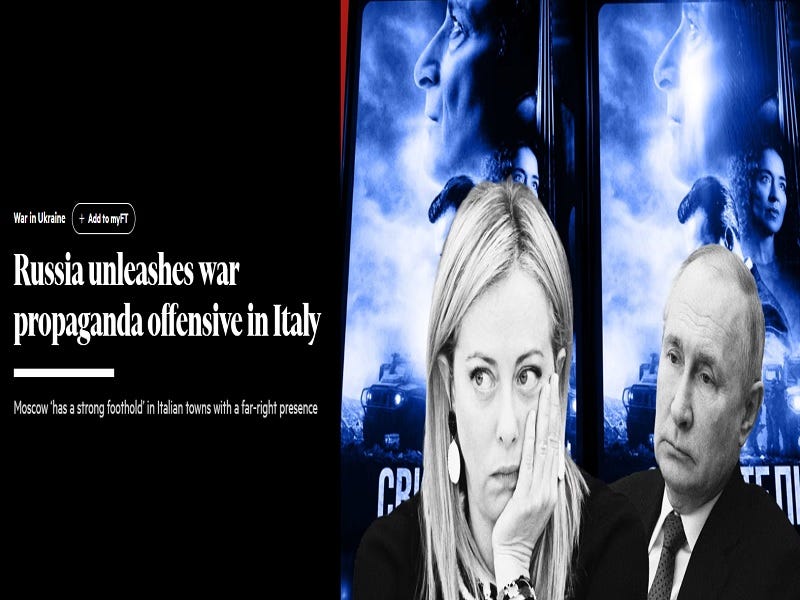This trend strikes fear in the hearts of eurocrats since they’re afraid that popular sentiment there could spread throughout the rest of Western Europe and herald an even larger sea change in public opinion than is presently manifesting.
The Financial Times (FT) published a piece on Monday that was dramatically headlined “Russia unleashes war propaganda offensive in Italy”, with the lede being that 80 Italians gathered to watch a Russian movie about Ukraine the day prior. This then led to the outlet talking about Russian socio-cultural organizations in Italy and the partnership that the ruling party’s junior coalition partner has with United Russia. Interspersed throughout the piece are accusations that Russia has many foreign agents in Italy.
What’s actually happening is a lot simpler, and it’s that Italians are growing weary of NATO’s proxy war on Russia through Ukraine. They’re traditionally a pacifist people with humanitarian impulses, as one of the cited opposition lawmakers described their compatriots, and these views align with Russia’s interests in reaching a compromise for ending this conflict. There’s nothing nefarious about this since it’s solely a coincidental confluence of interests that isn’t the result of any meddling or propaganda.
Nevertheless, this trend strikes fear in the hearts of eurocrats since they’re afraid that popular sentiment there could spread throughout the rest of Western Europe and herald an even larger sea change in public opinion than is presently manifesting. About that, a top European think tank just published the results of their survey from January showing that only 10% of people in the 12 countries that they polled think that Ukraine can win, with the data for Italy being especially interesting.
Only 6% of them share this view, while 19% think that Russia will win and 43% expect a compromise. Furthermore, 52% think that the EU should push the last-mentioned scenario compared with 18% who want it to continue supporting Kiev’s attempted reconquest of its lost lands. If Trump wins re-election and scales back support for Ukraine, 38% of Italians want Rome to follow suit versus 20% who want their country’s aid to remain the same and 11% who hope that EU aid will replace the US’.
The last data point of interest is that only 21% believe that the EU has played a positive role in this conflict, while almost two times as many (40%) believe that it’s been negative. Compared to France and Germany, Italy has a much more pragmatic and peaceful approach towards this conflict that’s only somewhat rivaled by Spain’s according to the survey, but Italy is still far ahead in most of these metrics. It’s not an insignificant economic or geopolitical player either and that’s why the eurocrats are so scared.
FT’s piece wraps up by suggesting that these sentiments could make it more difficult for Prime Minister Meloni, who clinched a security deal with Ukraine over the weekend and hinted at her country’s interests in the Balkans and Africa, to modernize the armed forces and replenish depleted stockpiles. While that’s possible, the latest trend in Europe nowadays as driven by the German example is leaders going against their people’s will to promulgate unpopular policies, including military ones.
It therefore shouldn’t be taken for granted that public opinion will influence the formulation of state policy in this respect, but just in case it does, the FT is already seeding the disinformation narrative that it would be the result of Russian meddling and propaganda. That’s an insult to those Italians who’ve independently soured on the Ukrainian Conflict and are now skeptical of related subjects like military modernization plans, but condescension is typical of eurocrats and their mouthpieces like FT.




